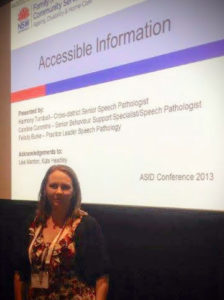My personal history with the topic…
When I was first asked what I would want to do for my Higher Degree Research there were a couple of things that came to mind. The topics I thought of were linked to my clinical experiences and issues that I had regularly experienced as I worked with people with lifelong disabilities across the lifespan. But there was one topic that came up again and again in my clinical practice – report writing!
As a new graduate more than 15 years ago I’m sure I struggled with expectations of when to write reports and what to put in them. I don’t think it would have ever entered my head to write that mealtime (swallowing assessment) report collaboratively with the Occupational Therapist and Physiotherapist I had worked so closely with to achieve positive outcomes for that client. I don’t recall ever asking my clients or their carers what they needed from my report and whether they could understand what was in it. Of course, we always explained our final reports with people (so that the understood the jargon and the recommendations) but why didn’t I think about writing them in a different way so that they could understand the report with less explanation?
Years later as a clinical supervisor I started to ask my colleagues why we wrote things (reports, letters etc) the way we did. Was there a better way to do things so that our audiences could understand them better? Some people joined me in asking these kinds of questions… others felt very uncomfortable and just wanted to keep doing what we’ve always done. Some people feared that if we started writing reports in ways that parents and carers could better understand, we’d need to write a second report for the GP, teacher, specialist that had all the ‘proper’ words (jargon) and complex sentence structures we use to make our writing ‘sound professional’. I started to feel that surely we could write one report that would be suitable for all the audiences… surely, if we wrote a comprehensive report that included all the important information but also explained jargon and used plainer language words and structures, everyone would be able to read it and understand it and be better able to use the information.
Fortuitously, I had some senior colleagues who felt the same way as me. One colleague had already been advocating in her role in the UK to have speech language pathologists write much plainer. She spurred me on to really look at this issue in more depth and we even collaborated (with a number of passionate speechies and our practice leader) to create a state-wide training package to build the confidence, knowledge and skills to start using plain language principles in their written work. This project gave us the opportunity to look at the evidence base… to our dismay (but probably not our surprise) we found VERY little research about the writing styles of allied health professionals or anything close to that topic! There was emerging evidence from the business sector about the use of plain language (Plain English) showing that it improved customer satisfaction and even could save businesses money. So, that’s what we worked from – surely if it was good for business it was good for our clients!
In 2012 we had a poster accepted to the National Speech Pathology Australia Conference reporting on the outcomes of our statewide training package. Here is a copy of the poster for your viewing pleasure: 1251_ADHC_Conference poster_170612
In 2013 I wrote a blog post about how I wished journal articles were written plainer for the ‘average’ therapist to read quicker and use the information more readily! I will include that post for your information and entertainment… Harmony’s 2013 Blog Plain language and clear communication …Enjoy!
In 2014 I curated the @WeSpeechies Twitter handle for a week and the topic? You guessed it: SLP/SLT Terminology, and Plain English in Practice! I’m working on a way to access my tweets from that week…
A few years later in my role as a clinical educator in a large university speech pathology clinic, I needed to teach student speech pathologists to develop their skills in writing various documents for parents, adult clients, teachers and more. Students had learned very high level academic writing skills and also learned that reports needed to to look a certain way and contain certain language in order to ‘pass’ as an appropriate report. Then we started to talk about who was reading the reports, and would they be able to understand it, and is it ok if they don’t understand so we explain it to them and send them on their merry way… We had the most interesting and thought provoking times in our group supervision sessions!
So, when it came to selecting a topic that I would feel passionate enough to spend many years researching, this one was an obvious one. All these years working on and around the issue of health literacy and the accessibility of allied health documents and now I get a chance to make a difference in the field!
